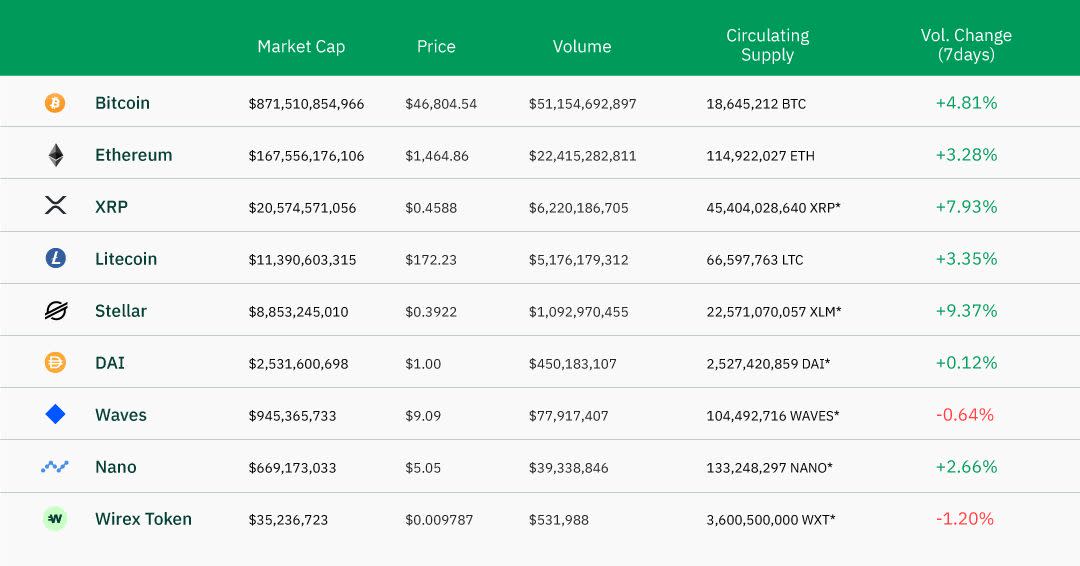
data taken at 9:02 am 05/03/2021
The Bitcoin price (BTC/USD) performance is rather flat this week, moving around the $50,000 level. It is still looking for a clear direction. The cryptocurrencies total market capitalisation has lost nearly 13% since the interview of the Chairman of the Federal Reserve (Fed), Jerome Powell, at the WSJ summit yesterday. Jerome Powell mentioned that he‘s “expecting employment to pick up in the coming months”. He’s also expecting inflation, currently still running below the 2% target, to rise temporarily with “a surge in spending as the economy slowly reopens”. But changing the public’s expectations with respect to inflation is a long-term process. The rising yields are expected to put pressure on borrow rates in the very short term, and might hinder the hopes of a quick inflation pick up.
As far as Bitcoin is concerned, the key takeaway from this interview is that the economy should be moving slowly, over years, towards its pre-pandemic state. Even though the decision to tighten the monetary policy will have to wait, the subject of the interview was axed around the necessary conditions to be able to raise the Fed rate. The Bitcoin price performance in 2020-2021 was partly driven by the large liquidity injections and stimulus packages pushed respectively by the Fed and the US government. The large amount of cash available favoured investments in cryptocurrencies. As the softer tone of Jerome Powell’s interview hinted towards a policy pivot, it naturally triggered a “small” correction of the BTC price, down by 7% from Wednesday’s close.

Despite the adverse macroeconomic conditions, the adoption of cryptocurrencies still has extraordinary potential. The main barrier for further adoption by institutions is regulatory, with one question on everyone’s mind: will the first US Bitcoin ETF be approved by the SEC this year? Certainly, our hopes are up with a new SEC governance under the leadership of Gary Gensler. Gary Gensler is a senior advisor to the MIT Media Lab Digital Currency Initiative: a great proponent of Bitcoin. The lab works with commitment to leverage the blockchain advantage.
Our hopes for the advent of the first US Bitcoin ETF are also up with the issuance last month of the first North American ETF in Toronto: the Purpose Bitcoin ETF (BTCC). BTCC is now holding $693mil of assets 2 weeks only after its inception. This is 11,350 BTCs held by the ETF already. It was followed by a slightly cheaper ETF (EBIT) launched by Evolve on February 19th, that gathered $50mil so far.
In Gary Gensler’s confirmation hearing for the SEC chair three days ago, senator Bill Hagerty asked about the SEC role under his new leadership and “how he will approach digital assets”. Gary Gensler’s answer was quite safe, stressing the importance of consumer protection. As Senator Bill Hagerty concluded: there is in the coming years a “great potential for leadearship” in this area and we should be careful not to bring “a too heavy hand”. Gary Gensler “could make a significant mark in this rapidly evolving market”. As the hearing moved along with Wyoming’s Senator Cynthia Lummis, Gary Gensler showed his grasp of the subject explaining the regulatory challenges in plain simple words. His views and skills will certainly help foster the crypto-economy. His teaching skills would improve the public’s understanding of the technology.
Understanding cryptocurrencies is of course essential for adoption. It would turn speculators and investors into consumers. A report published on February 17th by Cardify shows that “despite more people investing, the vast majority of crypto investors admit they have very little knowledge of how crypto markets actually work” although “the average investor holds ~13% of their portfolio in cryptocurrency”!
It was indeed time for an MIT professor to take the lead at the SEC, protect these unadvised investors, but also educate politicians, markets and the public about the true benefits of this booming sector.

Source: Cardify
